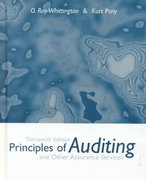A CPA's audit working papers include the narrative description below of the cash receipts and billing portions
Question:
A CPA's audit working papers include the narrative description below of the cash receipts and billing portions of internal control of Parktown Medical Center, Inc. Parktown is a small health care provider that is owned by a publicly held corporation. It employs 7 salaried physicians, 10 nurses, 3 support staff in a common laboratory, and 3 clerical workers. The clerical workers perform such tasks as reception, correspondence, cash receipts, billing, and appointment scheduling and are adequately bonded. They are referred to in the narrative as "office manager," "clerk 1," and "clerk 2."
Most patients pay for services by cash or check at the time services are rendered. Credit is not approved by the clerical staff. The physician who is to perform the respective services approves credit based on an interview. When credit is approved, the physician files a memo with the billing clerk (clerk 2) to set up the receivable from data generated by the physician.
The servicing physician prepares a charge slip that is given to clerk 1 for pricing and preparation of the patient's bill. Clerk 1 transmits a copy of the bill to clerk 2 for preparation of the revenue summary and for posting in the accounts receivable subsidiary ledger.
The cash receipts functions are performed by clerk 1, who receives cash and checks directly from patients and gives each patient a prenumbered cash receipt. Clerk 1 opens the mail and immediately stamps all checks "for deposit only" and lists cash and checks for deposit. The cash and checks are deposited daily by the office manager. The list of cash and checks together with the related remittance advices are forwarded by clerk 1 to clerk 2. Clerk 1 also serves as receptionist and performs general correspondence duties.
Clerk 2 prepares and sends monthly statements to patients with unpaid balances. Clerk 2 also prepares the cash receipts journal and is responsible for the accounts receivable subsidiary ledger. No other clerical employee is permitted access to the accounts receivable subsidiary ledger. Uncollectible accounts are written off by clerk 2 only after the physician who performed the respective services believes the account to be uncollectible and communicates the write-off approval to the office manager. The office manager then issues a write-off memo that clerk 2 processes.
The office manager supervises the clerks, issues write-off memos, schedules appointments for the doctors, makes bank deposits, reconciles bank statements, and performs general correspondence duties.
Additional services are performed monthly by a local accountant who posts summaries prepared by the clerks to the general ledger, prepares income statements, and files the appropriate payroll forms and tax returns. The accountant reports directly to the parent corporation.
Required:
Based only on the information in the narrative, describe the internal control weaknesses and one resulting misstatement that could occur and not be prevented or detected by Parktown's internal control concerning the cash receipts and billing function. Do not describe how to correct the weaknesses and potential misstatements. Use the format illustrated below.

Step by Step Answer:

Principles Of Auditing And Other Assurance Services
ISBN: 9780072327267
13th Edition
Authors: Ray Whittington, Kurt Pany





